Virtue and Economy: Essays on Morality and Markets: Rethinking Political and International Theory
Autor Andrius Bielskis, Kelvin Knighten Limba Engleză Hardback – 28 mai 2015
Preț: 1005.80 lei
Preț vechi: 1226.58 lei
-18% Nou
Puncte Express: 1509
Preț estimativ în valută:
192.45€ • 201.48$ • 159.25£
192.45€ • 201.48$ • 159.25£
Carte tipărită la comandă
Livrare economică 07-21 aprilie
Preluare comenzi: 021 569.72.76
Specificații
ISBN-13: 9781472412560
ISBN-10: 1472412567
Pagini: 264
Dimensiuni: 156 x 234 x 23 mm
Greutate: 0.61 kg
Ediția:New ed
Editura: Taylor & Francis
Colecția Routledge
Seria Rethinking Political and International Theory
Locul publicării:Oxford, United Kingdom
ISBN-10: 1472412567
Pagini: 264
Dimensiuni: 156 x 234 x 23 mm
Greutate: 0.61 kg
Ediția:New ed
Editura: Taylor & Francis
Colecția Routledge
Seria Rethinking Political and International Theory
Locul publicării:Oxford, United Kingdom
Recenzii
’Can one lead a good life in a market economy? This collection of essays provides critical and challenging answers to that question moving beyond familiar arguments about the injustice and unsustainability of advanced capitalist markets. Its authors, including Alasdair MacIntryre, argue that human relationships are distorted by the market and that both those who succeed and those who fail by its standards are deprived the opportunity to lead an ethically coherent life. Bielskis and Knight have carefully chosen essays which build on MacIntyre’s work and provide a rich introduction to a distinctly ethical critique of markets. It is a collection which deserves to be read.’ Ron Beadle, Northumbria University, UK ’This is an important and original work that provides a sustained ethical critique of the neoliberal principles that have governed economic policy and an extended critique of business ethics by Alasdair MacIntyre. A timely and necessary volume.’ Sean Sayers, University of Kent, UK ’For contributors from East and West, the recent global economic crisis is symptomatic of a deeper moral and intellectual crisis that undermines practical reasoning in the institutions that direct our economic and political lives. Applying Alasdair MacIntyre’s philosophy to modern liberal or neo-liberal institutions, this important volume brings a new perspective and valuable insight to contemporary ethics, politics and economics.’
Christopher Stephen Lutz, Saint Meinrad Seminary and School of Theology, USA
'Summing up, it is remarkable how many reflections, thought-provoking and useful for economic ideas, stem from MacIntyre’s thinking. This prompts me to suggest not only reading this book but also, even before, MacIntyre’s After Virtue, which is the root of these reflections.'
Ricardo Crespo IAE, Universidad Austral, Buenos Aires, Argentina
Christopher Stephen Lutz, Saint Meinrad Seminary and School of Theology, USA
'Summing up, it is remarkable how many reflections, thought-provoking and useful for economic ideas, stem from MacIntyre’s thinking. This prompts me to suggest not only reading this book but also, even before, MacIntyre’s After Virtue, which is the root of these reflections.'
Ricardo Crespo IAE, Universidad Austral, Buenos Aires, Argentina
Notă biografică
Andrius Bielskis is Professor of Political Theory at Mykolas Romeris University and a leading public intellectual in Lithuania. He received his PhD in Philosophy from the University of Warwick, and has taught political and moral philosophy at several British and European universities. Andrius is a founding member both of the progressive intellectual and political movement New Left 95 and of the DEMOS Institute of Critical Thought. Kelvin Knight is Reader in Ethics and Politics at London Metropolitan University, Director of its Centre for Contemporary Aristotelian Studies in Ethics and Politics (CASEP), course leader of its MA in International Human Rights and Social Justice, General Secretary of the International Society for MacIntyrean Enquiry, and Secretary of the Contemporary Aristotelian Studies specialist group of the UK Political Studies Association.
Cuprins
Introduction, AndriusBielskis, KelvinKnight; Part I The Virtue Critique of Capitalist Economy; Chapter 1 The Irrelevance of Ethics, AlasdairMacIntyre; Chapter 2 Neoliberalism and its Threat to Moral Agency, BobBrecher; Chapter 3 Economics as Ethical Pre-condition of the Credit Crunch, WilliamDixon, DavidWilson; Chapter 4 Is Aristotelian Capitalism Possible?, RajeevSehgal; Part II Polemicising the Critique; Chapter 5 Equality, Vulnerability and Independence, JohnO’Neill; Chapter 6 No Place to Hide for the Moral Self: Bureaucratic Individualism and the Fate of Ethics in Modernity, PeterMcMylor; Chapter 7 Reappraising Neoliberalism: Homo Economicus, Practitioners and Practices, MustafaOngun; Chapter 8 The Great Perverting Transformation, NikoNoponen; Part III Alternatives to Capitalist Economy; Chapter 9 Goods, Interests and the Language of Morals, PiotrMachura; Chapter 10 Formalising Functions: The History of a Passing Challenge to Capitalist Economy, KelvinKnight; Chapter 11 Towards a Critical Ethical Economy, RussellKeat; Chapter 12 How Is Ethical Revolution Possible?, Buket KorkutRaptis; Chapter 13 Anti-Capitalist Politics and Labour for the Twenty-first Century: History and Future Challenges, AndriusBielskis;
Descriere
Interest in Aristotelianism and in virtue ethics has been growing for half a century but as yet the strengths of the study of Aristotelian ethics in politics have not been matched in economics. This ground-breaking text fills that gap. Challenging the premises of neoclassical economic theory, the contributors take issue with neoclassicism’s foundational separation of values from facts, with its treatment of preferences as given, and with its consequent refusal to reason about final ends. Contributions critically engage with aspects of corporate capitalism, managerial power and neoliberal economic policy, and reflect on the recent financial crisis from the point of view of Aristotelian virtue ethics. Containing a new chapter by Alasdair MacIntyre, and deploying his arguments and conceptual scheme throughout, the book critically analyses the theoretical presuppositions and institutional reality of modern capitalism.












